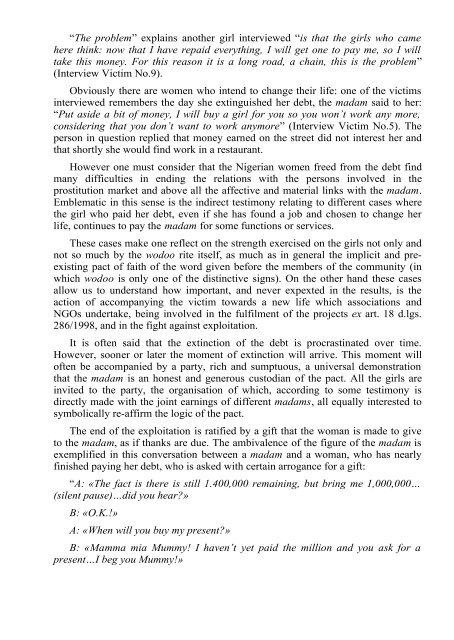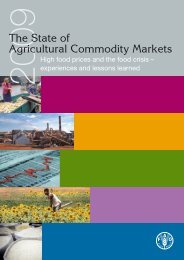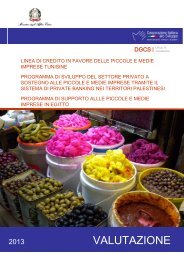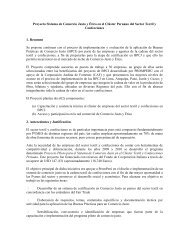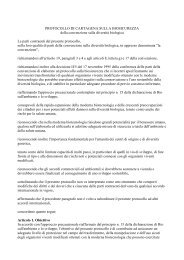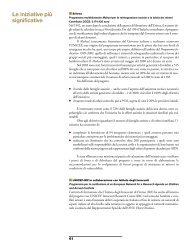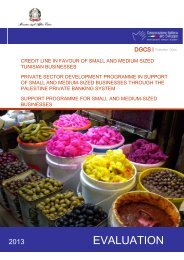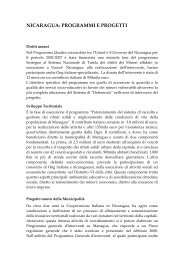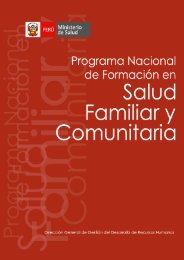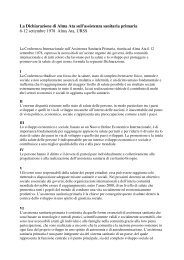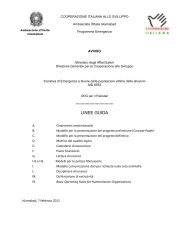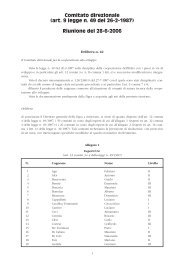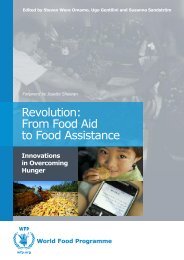here - Cooperazione Italiana allo Sviluppo
here - Cooperazione Italiana allo Sviluppo
here - Cooperazione Italiana allo Sviluppo
Create successful ePaper yourself
Turn your PDF publications into a flip-book with our unique Google optimized e-Paper software.
“The problem” explains another girl interviewed “is that the girls who came<strong>here</strong> think: now that I have repaid everything, I will get one to pay me, so I willtake this money. For this reason it is a long road, a chain, this is the problem”(Interview Victim No.9).Obviously t<strong>here</strong> are women who intend to change their life: one of the victimsinterviewed remembers the day she extinguished her debt, the madam said to her:“Put aside a bit of money, I will buy a girl for you so you won’t work any more,considering that you don’t want to work anymore” (Interview Victim No.5). Theperson in question replied that money earned on the street did not interest her andthat shortly she would find work in a restaurant.However one must consider that the Nigerian women freed from the debt findmany difficulties in ending the relations with the persons involved in theprostitution market and above all the affective and material links with the madam.Emblematic in this sense is the indirect testimony relating to different cases w<strong>here</strong>the girl who paid her debt, even if she has found a job and chosen to change herlife, continues to pay the madam for some functions or services.These cases make one reflect on the strength exercised on the girls not only andnot so much by the wodoo rite itself, as much as in general the implicit and preexistingpact of faith of the word given before the members of the community (inwhich wodoo is only one of the distinctive signs). On the other hand these cases<strong>allo</strong>w us to understand how important, and never expexted in the results, is theaction of accompanying the victim towards a new life which associations andNGOs undertake, being involved in the fulfilment of the projects ex art. 18 d.lgs.286/1998, and in the fight against exploitation.It is often said that the extinction of the debt is procrastinated over time.However, sooner or later the moment of extinction will arrive. This moment willoften be accompanied by a party, rich and sumptuous, a universal demonstrationthat the madam is an honest and generous custodian of the pact. All the girls areinvited to the party, the organisation of which, according to some testimony isdirectly made with the joint earnings of different madams, all equally interested tosymbolically re-affirm the logic of the pact.The end of the exploitation is ratified by a gift that the woman is made to giveto the madam, as if thanks are due. The ambivalence of the figure of the madam isexemplified in this conversation between a madam and a woman, who has nearlyfinished paying her debt, who is asked with certain arrogance for a gift:“A: «The fact is t<strong>here</strong> is still 1.400,000 remaining, but bring me 1,000,000…(silent pause)…did you hear?»B: «O.K.!»A: «When will you buy my present?»B: «Mamma mia Mummy! I haven’t yet paid the million and you ask for apresent…I beg you Mummy!»


